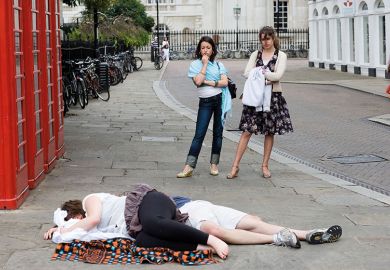This month, students in the UK and elsewhere will begin their university lives with freshers’ week. Many staff – and perhaps even students themselves – will be glad when this messy mix of taster lessons and bar crawls is over for another year. But in the guard room, we wish it ran for longer.
This isn’t because we enjoy scooping students who’ve had one too many out of wheelie bins. It’s because we’d love for there also to be time to teach incoming students a few life skills.
Some readers might see this as infantilising them. But as a campus guard, I often get to see the gaps between intellectual ability and common sense. Take the kid who phoned our emergency hotline to report a gas leak that turned out merely to be his hot water tank refilling. And, no, he wasn’t trying to have a bath to wash off the consequences of a long night in the students’ union bar.
We know, though, that the teaching syllabus is tight, and that fitting in a week or two of fun is already a stretch. So if we can’t expand freshers’ week into freshers’ term, perhaps academics could slip some useful pointers and home truths into their introductory teaching.
For instance, every university staff member has, at some point, been subjected to the “I’m paying your wages” argument from disgruntled students. Maybe finance lecturers could smuggle a slide into their first lesson explaining, first, that student loans are heavily subsidised by the taxpayer and, second, that many staff’s wages may not be enough to afford even a poverty diet by reading week given the spiralling cost of living.
In order for students to avoid being similarly penniless, marketing lecturers could warn them against the perils of Amazon and Deliveroo special offers, especially late at night. Perhaps the engineers could try to work out how to fit phones with breathalysers.
Meanwhile, chemistry undergraduates could be gently warned to beware of experimenting on themselves with illicit substances. These can impair judgement – particularly when security are called. Freshers always struggle to convince us that the box of 96 nitrous oxide cylinders we’ve intercepted is genuinely needed for repressurising their cans of spray cream – unless they have a weekend job driving a Mr. Whippy van.
With the terrifying news that beer in pubs might soon hit £20 a pint, introductory chemistry lessons could also warn students that brewing moonshine in halls of residence is not an acceptable way to reduce the cost of pre-drinking.
To medical course administrators: you’d be doing everyone a massive favour if you instructed all students to carry plasters and to brace for homesickness. As first aiders, security will always do our best to patch up people who have suddenly lost the ability to stand up, and we’re always here for a chat if anyone gets overwhelmed by their new life. What we’re not here to do is argue with a drunken radiologist who’s dialled 999 convinced that the bellyache he’s experiencing after an all-you-can-eat Chinese buffet is actually a panic attack.
Law and criminology lecturers, meanwhile, might like to open their modules with a line about the national noise curfew. Students partying in halls past 11.30pm should be encouraged to consider a silent disco instead. They could also be informed that you’re not legally permitted to smash open a vending machine just because it’s swallowed your Mars bar money. Nor can you make a citizen’s arrest on someone you believe to have cut in front of you in the kebab van queue. Nor can you lie to the cops that your ex-girlfriend is a self-harmer in an attempt to trigger an emergency intervention and embarrass her in front of her new housemates (the lad ended up being picked up himself for wasting police time).
Politics tutors could take up the challenge of explaining that students shouldn’t use politicians as role models. Yes, the UK’s former prime minister was reportedly allowed to put £27,000 of organic takeaways on expenses. But, no, that doesn’t mean students will get away with dashing into the canteen to snatch baguettes. Not unless they can outrun us, anyway.
This is where sports science students become a potential issue. Many are driven, focused and at their athletic peak. But while they might get away with the odd baguette, they should be warned off assuming that their prowess at sports translates to drinking games. Team scouts won’t be impressed by people who spend the weekend drinking/playing rugby/not sleeping/skipping breakfast and end up horizontal, surrounded by concerned classmates.
Media lecturers should take note here, too. You’ll save everyone a lot of pain if you remind your students that it’s not nice to share photos of people who’ve overindulged.
But it is geography lecturers who have the most basic lesson to inculcate: learn how to make it sensibly back to your own flat before you head out on that bar crawl. “Extreme urban exploration” is strictly for the pros – not for three tanked-up blokes trying to do parkour on a bike shed roof.
I wish, though, that we’d obtained video evidence of that one before we hauled them down and instructed them to find the fastest and most efficient way back to their bedrooms via accepted routes. I wouldn’t share it, but I’d enjoy another look.
George Bass is a security guard at a UK university.
POSTSCRIPT:
Print headline: Freshers’ crash course in life skills
Register to continue
Why register?
- Registration is free and only takes a moment
- Once registered, you can read 3 articles a month
- Sign up for our newsletter
Subscribe
Or subscribe for unlimited access to:
- Unlimited access to news, views, insights & reviews
- Digital editions
- Digital access to THE’s university and college rankings analysis
Already registered or a current subscriber?








